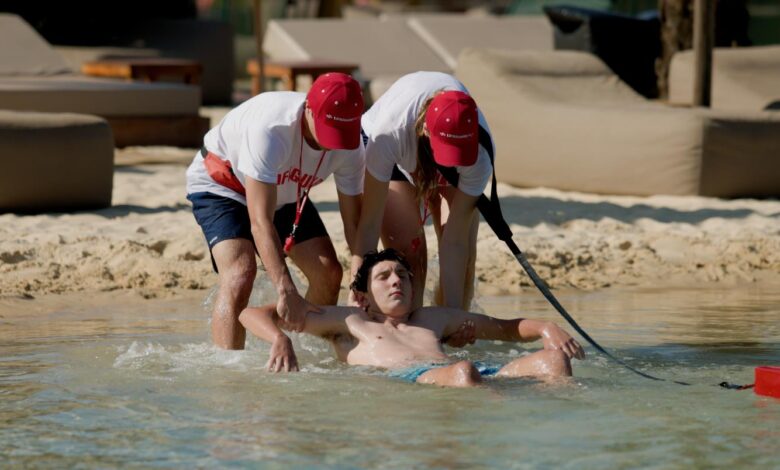Becoming a Lifeguard: Essential Skills and Training

What is Lifeguarding?
The role of lifeguarding is crucial for maintaining safety in aquatic settings like pools, beaches, and water parks. This profession requires an extraordinary blend of skills, lifeguard training, and properties to instantly address emergencies, limit accidents, and establish a protected and charming environment for all guests.
Physical Wellness
Physical wellness is a foundation of lifeguarding. Lifeguards should have incredible stamina, strength, and readiness to successfully play out their obligations. They should have the option to swim significant distances, tow people in trouble, and perform rescues in testing conditions.
Swimming Capability
A strong swimming skill is a fundamental prerequisite for lifeguards. They ought to be capable of different swimming strokes and techniques to explore water swiftly and proficiently contact people needing help. Lifeguards frequently go through thorough swim tests during their training to guarantee they satisfy the vital guidelines.
First Aid and CPR
Lifeguards are prepared in first aid and cardiopulmonary revival (CPR) techniques to give prompt help to people encountering medical emergencies or injuries. They should have the option to evaluate what is happening rapidly, direct fundamental medical considerations, and start CPR if important, all while trying to avoid panicking under tension.
Communication Skills
Powerful communication is essential for lifeguards to pass significant data on to benefactors and direction with team individuals during emergencies. Lifeguards should have the option to give clear directions, give consolation to people in trouble, and discuss really with assorted gatherings, including kids and grown-ups.
Watchfulness and Mindfulness
Lifeguards should keep up with consistent cautiousness and situational attention to identify possible risks and prevent accidents before they happen. They are prepared to examine their doled-out regions routinely, perceive indications of pain in swimmers, and mediate speedily to guarantee safety, everything being equal.
Critical thinking skills
Fast and unequivocal direction is a critical skill for lifeguards. They frequently face quickly advancing circumstances that expect them to survey risks, focus on actions, and execute viable systems to determine emergencies. Lifeguards should have the option to think and react quickly and make good decisions under tension.
Rescue Techniques
Lifeguards are prepared with an assortment of rescue techniques to answer different sorts of emergencies. These techniques might incorporate arriving at help, where lifeguards use rescue equipment to contact people in trouble, tossing helps, where lifeguards toss buoyant gadgets to aid swimmers, and in-water rescues, where lifeguards enter the water to help upset people physically.
Risk Assessment
Surveying risks is an indispensable piece of a lifeguard’s responsibility. Lifeguards should have the option to identify potential dangers like strong flows, underwater impediments, or perilous weather patterns and go to proactive lengths to alleviate these risks. They may likewise team up with facility chiefs and other staff individuals to carry out safety protocols and guarantee a protected environment for supporters.
Teamwork and Collaboration
Lifeguards frequently fill in as a feature of a team to guarantee exhaustive inclusion of their relegated regions and back each other during emergencies. Viable teamwork and collaboration are essential for planning rescue endeavours, sharing data, and maintaining an elevated degree of safety through the aquatic facility.
Profound Versatility
Lifeguards need to have profound versatility to adapt to the difficulties and stresses of their job. They might experience upsetting circumstances, like accidents or injuries, and should resist the urge to panic, be centred, and create while giving help and backing to those out of luck.
Constant Training and Certification
Lifeguard training is a continuous cycle that requires nonstop learning and skill development. Lifeguards are urged to partake in lifeguard classes and training programs presented by respectable organizations to improve their knowledge, remain refreshed on industry best practices, and keep up with their lifeguard certification.
Community Commitment and Public Education
Notwithstanding their essential responsibilities, lifeguards frequently participate in community outreach and public education drives. They might direct water safety studios, give exhibits on appropriate swimming techniques, or team up with schools and local organizations to advance drowning prevention and water safety mindfulness. These endeavours assist with preventing accidents as well as encourage a culture of safety and responsibility among community individuals.
Professional Development and Career Opportunities
Becoming a lifeguard can likewise open the way to a scope of career opportunities inside the aquatic and safety industry. Lifeguards who exhibit outstanding skills, initiative capacities, and a commitment to progressing professional development might seek cutting-edge lifeguard certifications, like Water Safety Instructor (WSI) or Lifeguard Instructor (LGI), permitting them to prepare and guide future lifeguards.
Moreover, lifeguards with experience and mastery might investigate careers ways in aquatic management, risk assessment, crisis response coordination, or even seek after roles in sporting therapy or physical education. Lifeguarding can act as a venturing stone to a satisfying and significant career committed to advancing safety, well-being, and aquatic happiness for people of any age and capacity.
Concluding Remarks
Becoming a lifeguard is a remunerating yet requesting profession that requires a different scope of skills, from physical wellness and swimming capability to first aid, communication, and direction. Lifeguards play a crucial role in guaranteeing the safety and prosperity of people in aquatic environments and should go through thorough training and certification to succeed in their roles.
By consistently improving their abilities and remaining refreshed on industry standards, lifeguards contribute to making protected and charming encounters for supporters at pools, beaches, and water parks the nation over.



